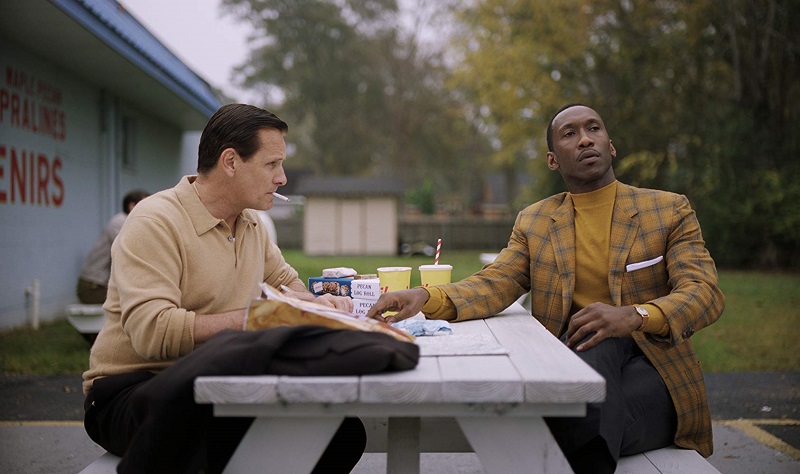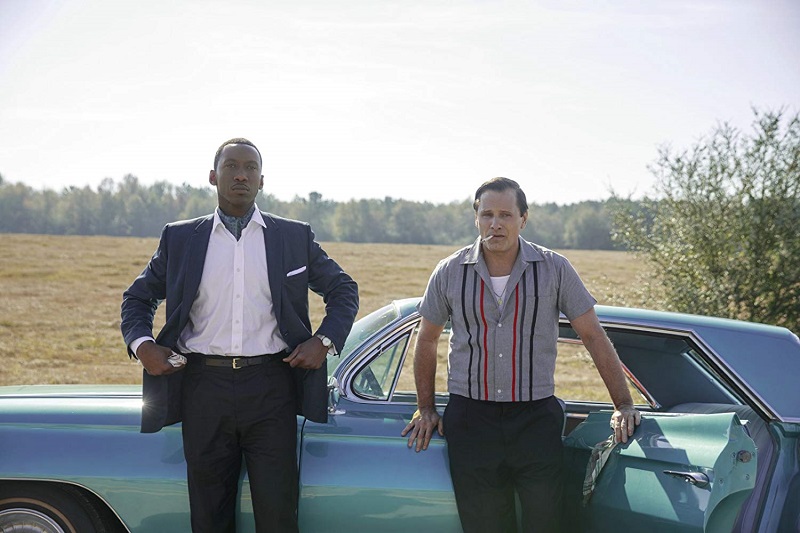Not sure what is more surprising: The fact that the incredible true story of the friendship between Dr. Don Shirley (Mahershala Ali) and Tony Lip (Viggo Mortensen) hasn’t been made into a movie before now or the fact that the stunning film was directed by Peter Farrelly. That’s right, the director (with his brother) of Dumb and Dumber and There’s Something About Mary has helmed a motion picture that is getting major Oscar buzz for Best Picture, Best Actor(s) and yes… Best Director.
It is the early 1960s and Shirley is a musical sensation. The pianist is touring with his The Don Shirley Trio and they are heading into the deep South. The gifted musician needs a driver. Tony comes highly recommended and given the fact that his regular gig, as a “bouncer” of sorts at NYC’s Copa Club is on hold for two months—the timing is perfect. During his interview, Shirley asks Tony if he would have any problems working for a black man. He answers no, but Tony does stress that there will routinely be major issues as they traverse a geographical locale that still firmly believes that the Civil War ended wrongly.
Green Book is a gentle story, affectionately told in such a manner that leaves the audience feeling as if their hearts have grown. There are feel-good movies, and then there is Farrelly’s latest. The film also leaves us with an undeniable sense of hope stemming from its handling of this unlikely friendship that grew out of one simultaneously stressful and blissful road trip. Often, films that chronicle a kinship between two souls that are earthshaking and the embodiment of change in America fall short due to misguided plot turns or performances that are more two-dimensional.
Both Ali and Mortensen have characters that could easily have been cardboard cutouts. Ali’s Shirley is highly educated and could be perceived as being high-strung. He’s an African-American who does not feel comfortable in white or black worlds. Meanwhile, Mortensen’s Tony could easily have been painted as a stereotypical early 60s Italian-American caricature. He doesn’t talk so good and uses his fists more than his intellect to forge his point. Yet, in Nick Vallelonga, Brian Hayes Currie and Farrelly’s script, there is a richness to these two that has both pop off the screen. Both actors take the gift that is the trio’s screenplay and not only make it their own but elevate the prose to levels that are beyond brilliant.
Ali, fresh from winning Best Actor for his work on Moonlight, embodies Shirley in a manner that elicits a complicated web of emotions in response to what he must endure. He is a gifted pianist who has the power to bridge the racial divide if people will just shut their eyes to his color and open their ears to his titanic talent. In the hands of the Oscar winner, audiences will emerge from witnessing Green Book with the most visceral of responses. Don’t be surprised if one is compelled to reach up to the big screen and give the guy a huge hug. He is the incarnation of where race relations were in the early 60s and sadly, where we firmly still are today in the Donald Trump “nationalist” pride landscape.
Mortensen should easily hear his name called when Oscar nods are announced in January. He is one of our most gifted thespians and there should be little surprise at the affable whirlwind, tour-de-force performance he delivers in Green Book. It is unlike anything the actor has given audiences in his diverse and lauded career. Viewers are no fools. We have seen the Italian American, “how you doin’?!” embodiment before and as the film commences and we meet Tony and roll with him through that opening act, it would be easy to think that this is something that we’ve seen before. But there is an astounding lushness to Mortensen’s take on Tony. Through his eyes, there is a myriad of societal ills that need to be altered and if it were up to him, every racist would be dealt with with his fists. With the actor digging deep into his toolbox, the complexity of the situation is heightened and made real in such a way that is terrific… all because this story demands it.
Farrelly illustrates some priceless gifts of his own. His use of pacing is flawless throughout. As we progress through the film, plot reveals, emotive power and its wider societal commentary are achieved in the highest order. Green Book is not only one of the best films of the year, it has the potential to be one of those movies that transcends time and topic and enter the pop culture lexicon lauded for its ability to bring us together—mirroring the relationship between Tony and Shirley in real life.
Sure, the film is about a musician and one would expect that the score and soundtrack would be top notch. But that doesn’t even scratch the surface of the awesomeness that is the job the music supervisor and Farrelly achieved. They utilize sonic succulence in such a way that it manages to make the movie’s points—emotionally and dramatically—through a means that Shirley used in real life to express his complicated life… music.
Green Book also is terrific in that it never tries to change the world beyond the reality that exists between the two real-life leads. The story says so much all on its own, there is no need to grab a soap box and begin preaching. This is a study in how a filmmaker uses the supremist of confidence in his story and letting it do all the talking without forcing opinions, exposing societal rights and wrongs and the power of interpersonal relationships to alter the course of history on the audience.
The film is also a must-see for a segment of the population who believes that since we elected a black president, the race issues in America are over. Yes, this takes place decades ago. One thing becomes glaringly clear in Farrelly’s film—we as a country still must come to terms with the racial divide that still has its flames stoked by those in our citizenry and government who still believe that America needs to become great again. That is code for returning our nation to a time where we were split by the color of our skin. There is nothing great about that and as illustrated in Green Book, greatness in America can only be achieved when every soul has an equal and realistic chance of achieving their dreams.
Grade: A+



